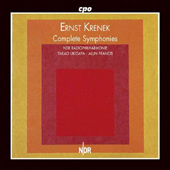
ESSENTIAL RECORDINGS

Almost twenty years ago we recorded Ernst Krenek's symphonies and released them in rapid succession. Following the recent discovery of the score
of his Symphony No. 4 in the United States, we were also able to release this work, which had been regarded as lost. And now we are proud to
present the completion of our complete recording of Krenek's symphonic works featuring his five symphonies in a box of four CDs.
When Vol. 1 was released, the American magazine Fanfare wrote in 1996, "This series will become a milestone. Outstanding dynamics, excellent
sound. An epochal cycle." And, truly, in all his symphonies, no matter how different they may be, Krenek proved to be a composer who knew how
to write suspenseful music in the best sense of the term. From neobaroque phases with infectious drive to works of the highest complexity in free
atonality but with tonal elements of design, he was always able to draw on his multifacetedness to create surprises, and the interpreters selected by
us prove to be his perfect advocates: "The NDR Radio Philharmonic, certainly one of the most inquisitive German radio orchestras, holds in store
precise, atmospherically rich interpretations. Finely heard-out balance and tonally finely harmonized articulation." {CPO}
Composer Ernst Krenek (1900-1991) has been described as the "one-man history of 20th century music". True, one hears different
facets of the many influences that fuel his writing, including Schreker (his teacher), Weill, Schoenberg, Webern, Shostakovich, K. A. Hartmann and Mahler (his short
lived father-in-law). But in the end, the music's impetus and complex inner structures, are definitely his own. A strong voice that due to its uncompromising
outer facade, has been given the cold shoulder by some, and completely misunderstood by others. Some critics have said that his music is acerbic and
requires "endurance" on the part of the listener, when all it really needs is interest, and a good measure of attentive listening. Many, many other composers
were farther out in left field then he ever was. His attention to a myriad of details rather than the overall structure of a work is more than likely the reason
why one doesn't instantly get drawn into it. It is at times dense and harmonically advanced, but there is always a strong and discernable thread
that runs at the core of each work, and the orchestra is always employed as a living organism breathing life into the score.
Attesting to the fact that Ernst Krenek was also a human being and not only a symphonic motif-linking machine, works of his like
the lighter "twenties-pop" tinged Potpourri and the Concerto Grosso present a lighter,
yet still convincingly erudite side of his art. The Concerto is dressed with a baroque outer shell, but at its core is built upon very impressive neo-romantic
gestures. Its opening Allegro could very well play the part of a Scherzo within a Mahler symphony, and both of its slow movements clearly
demonstrate that if you listen through the exterior complexities, you can hear the beat of a human heart.
A deep intellect lies behind every note of this music, but once the orchestra lifts it from the printed score, it becomes animated and full of life's energy.
These CPO recordings featuring the NDR Radiophilharmonie should be all the evidence one needs to pull Krenek
out of the wings, and place him front and center on the stage along with the other important figures, before taking a snapshot of all the 20th
century alumni.
Jean-Yves Duperron - June 2012